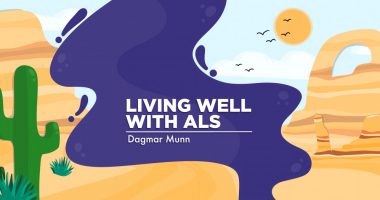My ALS Week: Voice Therapy, New Exercise Ideas, and the Loss of a Colleague

This past week had me experiencing a roller coaster of emotions. I started with a feeling of pride while reading a recent study that validated my at-home voice therapy sessions. Next, curiosity drew me into investigating an innovative exercise program designed for Parkinson’s patients. Then, the week ended on a sad note as news spread within BioNews, the parent company of ALS News Today, that one of our beloved patient columnists had passed away.
Déjà vu
Like most ALS patients, my symptoms began in my lower legs and feet and then later affected my speech and swallowing. I immediately cobbled together an at-home regimen of therapy that expanded on the techniques I had learned in a program called Living Speech Series. These included daily diaphragmatic breathing exercises and a voice study to practice specific conversation skills.
Imagine my delight while reading about a recent home-based music therapy study developed in the U.K. and Russia, that was aimed at improving speech, swallowing, and breathing. What did study participants do? Individually modified breathing exercises, relaxation, and voice skills to encourage “healthy voice use habits in daily life,” according to ALS News Today‘s Lindsey Shapiro. And even though this small pilot study wasn’t designed to test the program’s effectiveness, the data collected pointed to the therapy program’s positive effect in easing bulbar symptoms for the participants.
I felt validated. But I’m already dissecting the full study to see what else I can learn and apply to my own routines. Look for future columns in which I provide readers with an update about how I’m doing.
Something new
Next, I found an interesting study at Parkinson’s News Today. Why do I visit that website? Because those of us with rare diseases are part of a larger community, and we can learn from one another. This study looked at a four-week exercise program done at home to improve one’s ability to rotate the body and find balance. That certainly grabbed my attention.
According to Parkinson’s News Today‘s Steve Bryson, Parkinson’s patients can develop trunk rigidity that makes turning difficult, which increases the risk of falling. While reading the story, I immediately noticed similarities to ALS. In our case, ALS involves a lot of sitting, which reduces blood flow to our arms and legs. It also increases swelling and weakens muscles. Having rigid or weak muscles can increase the risk of falling.
The exercise program mentioned in the study involves rotating different parts of the body, including the head, shoulders, and hips, while in positions like sitting, standing, and lying down. My own exercises include rolling from my back to my front while on the floor. But I’ll certainly start doing more rotations while seated and standing — and safely holding on to my rollator, of course!
Again, I’ll report back in a few weeks and share my thoughts about these exercises.
Sad thoughts
Our ALS News Today family was saddened by the recent passing of columnist Rick Jobus. After being diagnosed with ALS in 2007, Rick had written the column “Notes From the ALS Front” for the past four years.
While we didn’t have much direct interaction, apart from sharing supportive comments on each other’s columns, I admired Rick’s writing, his ALS warrior spirit, and his uncanny knack for combining technical facts and information with the poetry of rock ‘n’ roll lyrics. Plus, I was always in awe that he wrote his columns using eye-tracking software. Each word was painstakingly created by his eyes, which selected letters on a computer screen.
We lost a strong voice in our ALS community. My thoughts and condolences are with Rick’s family during this difficult time.
Note: ALS News Today is strictly a news and information website about the disease. It does not provide medical advice, diagnosis, or treatment. This content is not intended to be a substitute for professional medical advice, diagnosis, or treatment. Always seek the advice of your physician or other qualified health provider with any questions you may have regarding a medical condition. Never disregard professional medical advice or delay in seeking it because of something you have read on this website. The opinions expressed in this column are not those of ALS News Today or its parent company, BioNews, and are intended to spark discussion about issues pertaining to ALS.








Comments
Marc charette
How can I get the Living Speech Series. It sounds very helpful. Thank you.
Dagmar Munn
Hello Marc, here is the link to Andrea Caban's online course, "Living Speech Series" http://www.andreacaban.com/als
Dagmar
Chris King
Last clinic visit I mentioned the Living Speech Series to the speech pathologist as I'd read your article on it and that your SP was interested and supportive since they've offered me nothing and I feel like it can't hurt plus helps me mentally to feel proactive as my speech was first indication and at 71 when I started this journey 6 years ago first thing they looked at was TIA's due to family history and CAD with heart attack in 2008. The SP at my clinic said waste of money after briefly scanning webpage, waste of money was the tobii dynavox that's so cumbersome and slow I use it for tablet but doesn't interface with my iPhone or have current windows programs! I appreciate your research and information on this and other topics, still considering trying if for no other reason than I love to sing. Parkinson info always good, originally diagnosed with Parkinson's syndrome so joined local group and participated in their exercise program at local Y 5 days a week, amazing programs, miss them and the people! Thanks Chris
Dagmar Munn
Hello Chris, I am sorry to read that your Speech-Language Pathologist brushed off the concept of helping you retain what little voice you have.
I believe the study I wrote about is another indication that yes, there are vocal skills we can use and, yes, many of us are motivated to do them. If she will not teach you these simple vocal skills (that all SPL know) then practice them on your own: change chest breathing to diaphragm breathing, adjust to a lower pitch, move consonants to the front of the mouth, and hum or sing (saying more words with each exhale).
Best to you, please keep in touch. Dagmar